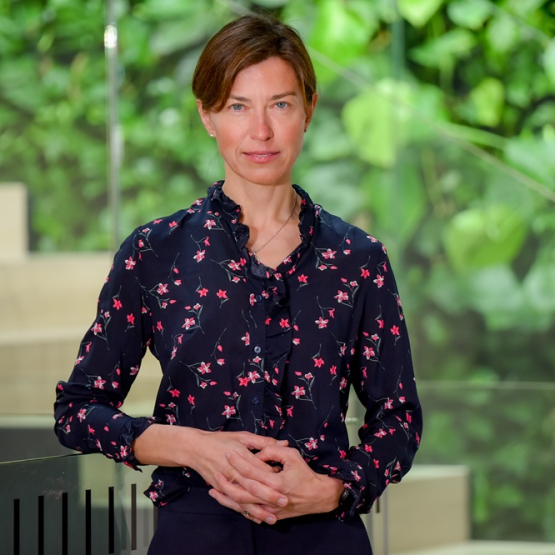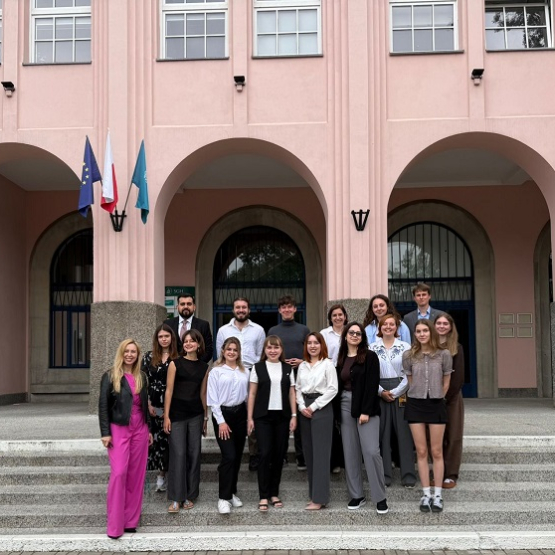From the office of the Vice Rector for International Relations: SGH strengthens its international position

The last few months have been extremely intensive at SGH in terms of international cooperation. We have been busy developing our network of foreign partner universities, strengthening our staff’s competences in multicultural communication and taking part in accreditation procedures.
As part of our efforts to obtain the prestigious EQUIS accreditation, on 8–11 June 2021 we virtually hosted a four-member commission from the EFMD (European Foundation for Management Development, which is a foundation with a global reach), which held many meetings with the SGH authorities, representatives of academic and non-academic staff, our students, graduates and business partners. Nearly 100 people from our University participated in the meetings. The visit was preceded by months of hard work, analysis and consultations, helping us to prepare a comprehensive Self-Evaluation Report, which we sent to EFMD. Moreover, in accordance with the accreditors’ guidelines, a dedicated 10-minute film was prepared to give the commission members a virtual tour of our campus.
The visit proceeded according to schedule, with full involvement of all participants. It was nice to hear the accreditors use such expressions as “acting passionately” or “showing pride in the University” with reference to the SGH and our efforts during the meetings. In participants’ opinion, the EQUIS accreditation process triggered huge mobilisation among the SGH community, and some participants even proposed that we should participate in such undertakings more often. We have immediately responded to these suggestions and are happy to say that we are well advanced in the AACSB. accreditation procedure. It is my promise that we will have many more opportunities to demonstrate our strength as a leading business and economics school.
Obviously, this is not yet the moment for summaries and conclusions, but I would like to take this opportunity to thank all of those who were actively involved in preparing the materials for the Self-Assessment Report and the visit. The decision on our EQUIS accreditation will be taken at the EFMD Accreditation Committee meeting this autumn, so all we can do is to wait patiently. Let us all keep our fingers crossed!
We are also expanding cooperation with partner universities and academic cooperation networks. In April 2021, the SGH joined the Global Business School Network (GBSN), which brings together prestigious business schools from around the world. GBSN’s mission is to improve access to high quality local management and entrepreneurship education in developing countries. Business schools can support sustainable development, which is clearly in line with the SGH’s vision and mission. Our participation in the GBSN network offers new opportunities for valuable academic and research networking, and I strongly encourage you to take advantage of the opportunities provided by our GBSN membership.
In an effort to engage more dynamically in the region of Central and Eastern Europe, we have joined the initiative to establish a cooperation network of universities in our region: the Central European Network of Universities (CENU). The aim of this new platform of cooperation is to reinforce the voice of universities from our region in discussions on the major challenges related to the developments in higher education across Europe and to build international prestige of our universities. We have already held the first meeting with partner universities from Hungary, the Czech Republic, Slovakia and Croatia. We will spend the coming months developing specific projects and initiatives that will allow CENU to develop robustly. Everyone, both staff and students, is kindly invited to join this initiative.
Our commitment to raise the profile of the SGH in the region is also reflected in the Central Europe Connect (CEC) programme, which has been running for several years. CEC is designed for undergraduate students interested in business in Central Europe. From March to May 2021, together with the Vienna University of Economics and Business (WU) and the University of Economics in Bratislava (EUBA), we conducted the fifth edition of this programme. Due to the COVID-19 pandemic, all three one-week modules of the spring edition, which incorporated teaching and meetings with companies, were carried out virtually using the MS Teams platform. Recruitment for the next edition, which will be launched in the upcoming winter semester, is now open and closes on 20 July 2021. Undergraduate students are invited to apply.
Strengthening individual and institutional competences in international collaboration is also an important part of the internationalisation of our University. Two months ago, we completed activities under the Welcome to Poland #SGH4U project. As the training courses organised by the SGH International Centre on internationalisation competences for SGH staff and students attracted a lot of interest, we decided to organise subsequent editions of these courses outside the Welcome to Poland project. An e-learning course on cultural differences (in Polish and English) is now available on the e-SGH platform. The International Centre has also launched the #SGH4U Library, which contains nearly 200 interesting books and practical guides on conducting training and multicultural communication. I hope that these resources will prove useful and will provide significant support to the processes of “internationalisation at home.” Moreover, as part of the Welcome to Poland project, SGH employees had the opportunity to participate in a training course on building leadership competences in crisis situations in higher education, organised by Harvard Kennedy School.
Another project supporting the internationalisation of our University, implemented with significant support of the International Centre, is called BUSINESS LEAD (New Business Leaders for a New World). The project received NAWA funding under the “SPINAKER – intensive international education programmes” programme. BUSINESS LEAD is an innovative project aiming primarily to educate female students from developing African countries and to build their personal and professional competences in business. It fits into the SGH’s internationalisation strategy as well as the Sustainable Development Goals (SDGs 1, 4, 5, 10) and the EU’s strategy to combat global exclusion and poverty. Over the next two years, we will work under BUSINESS LEAD at SGH to educate a total of 60 female students from countries such as Senegal, Ethiopia, Tanzania, Kenya and Mauritius. We will also host academic staff from partner universities in these countries.
In May, we applied to the European Commission for funds for activities under Key Action 1 of the Erasmus+ programme in its new version. Short-term mobility within the so-called Blended Intensive Programmes (BIP) and mobility of doctoral students will be added to the existing portfolio. Activities in this project will begin on 1 September 2021. We will provide updates on the possibilities offered by the new Erasmus+ as they become available.
Recent weeks were also very intensive for the CEMS MIM programme. As part of our campaign to promote qualification for the programme, we organised several online events to present the programme. The next recruitment round will start on 25 October 2021 (for information, please check the SGH’s CEMS website).
We are gradually opening up to the post-pandemic world and will soon announce the call for applications for teaching and training trips from the previous Erasmus+ edition (KA103 and KA107), as grants are still available there. I would like to encourage those of you who successfully qualified in the previous rounds but did not make their trips due to the pandemic to renew contacts with partner universities to organise your visit. Let me invite all of you to follow the updates about this recruitment which will be posted in the International Centre’s website, on the SGH International fan page run by the International Centre and in mailings to our staff.
In the current term of office at the SGH, I also have the pleasure of taking care of the MBA Programme Office. February and March saw the launch of the English-language Canadian Executive MBA (CEMBA), the 22nd cohort, and the Polish-language MBA-SGH, the 10th anniversary cohort. Recruitment for both programmes took place in extremely difficult pandemic conditions. Classes are still conducted only remotely. Notably, the 10th edition of MBA-SGH attracted record levels of interested participants. The number of excellent candidates who met and exceeded the demanding recruitment criteria was significantly higher than the number of places offered, which is why we created a group with excellent and extremely diverse competences.
Recruitment is also underway for the MBA SGH-WUM in Healthcare programme. This 4th edition is scheduled for launch in the autumn of 2021. We hope that the situation will allow us to hold face-to-face classes by then.
May was filled with diploma award ceremonies for graduates of two programmes. For the first time in the history of MBA programmes at SGH, a remote graduation ceremony was held for graduates of the 8th edition of MBA-SGH. Despite its unconventional form, the ceremony had a solemn character and will surely be remembered by its participants. The award ceremony for graduates of the 2nd edition of MBA SGH-WUM in Healthcare was held in the Main Hall of SGH, in compliance with the sanitary regime, because the group of graduates was small (13 people). The best lecturers of the most recent editions of the programmes also received awards during both ceremonies.
One of the most important recent events for the MBA Programme Office was the expansion of the portfolio of programmes offered. In addition to the three previously mentioned programmes, we added the MBA for Startups – SGH Online for Entrepreneurs, a programme designed for young entrepreneurs. This will be a fully remote programme (also after the pandemic), and we will draw on our recent experience in delivering it. Although the recruitment has only just begun, we have already noticed immense interest in this programme.



